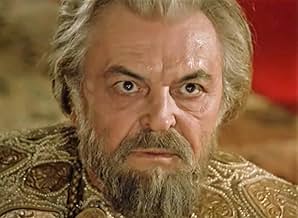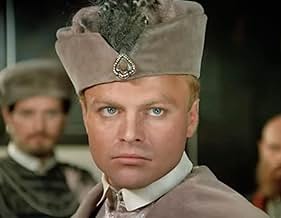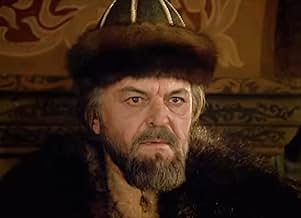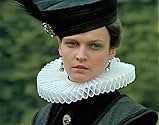Füge eine Handlung in deiner Sprache hinzuBased on the Alexander Pushkin's play, epic story about Tsar Boris Godunov, who reigned over Russia between 1598 and 1605.Based on the Alexander Pushkin's play, epic story about Tsar Boris Godunov, who reigned over Russia between 1598 and 1605.Based on the Alexander Pushkin's play, epic story about Tsar Boris Godunov, who reigned over Russia between 1598 and 1605.
- Regie
- Drehbuch
- Hauptbesetzung
- Auszeichnungen
- 1 Gewinn & 1 Nominierung insgesamt
Alyona Bondarchuk
- Tsarevna Kseniya
- (as Elena Bondarchuk)
Gennadi Mitrofanov
- Yurodivi
- (as Gennady Mitrofanov)
Fedor Bondarchuk
- Tsarevitch Fyodor
- (as Fyodor Bondarchuk)
Marian Dziedziel
- Adam Vishnyevetski
- (as Marian Dzhendzhel)
Empfohlene Bewertungen
I was delighted to find this film with English subtitles, for which the translation deserves a mention. I don't speak Russian and therefore do not know how much of the Shakespearian style poetic flow was due to Alexander Puskin, but the English style works in a way modern English could never. Set at the same time as W. Shakespeare was writing his plays of plotting and deceit, with rivals skulking in corners muttering asides filled with 'forsooths' and 'wheretofores' this film of the play fit right in. Add the spectacle, Falstaffian broad farce at the inn and the gorgeous settings, I found this film a total feast for the eyes and ears.
It is indeed difficult to watch this film without hearing the Moussorgsky score in the back of one's head, even when familiar with the language and the original play. Pushkin's Shakespearian interpretation of Russian history was prohibited from the stage for nearly fifty years after the poet's death, and the Moscow stage director, Yuri Liubimov, had similar difficulties getting permission for his production around the same time as the making of this film. Bondarchuk's version has both the strengths of massive USSR state subsidy to ensure the historical accuracy of settings and costume, with the attendant weaknesses of a work that avoids any attempt at parallels with contemporary life. Bondarchuk's earlier film adaptation of Tolstoy's "War and Peace" successfully transferred a realist historical epic in novel form to its cinematic equivalent; adapting a verse drama with insertion of visual flashbacks and dream sequences attenuates the dramatic form without the dramatism of the human voice provided by the operatic version. I am not surprised that a subtitled version is hard to find: the effect of converting Pushkin's poetry to prose would further diminish the actors' mastery.
Despite these caveats, the film is visually intriguing and well-acted -- an interesting footnote in the history of Soviet-Russian film.
Despite these caveats, the film is visually intriguing and well-acted -- an interesting footnote in the history of Soviet-Russian film.
For many years, in the former USSR, filmmaker Sergey Bondarchuk was considered a Holy Cow, an untouchable top, a true authority, so no one, but no one could ever even think of criticizing his work. He was supported by the highest Soviet Powers, given tons of money, and yes, he made two absolute masterpieces - epic war dramas War and Peace, and Waterloo.
By 1986, he was old, ramshackle and out of step with modern cinema of the time. He felt lost and helpless. Yet, he did try his last movie - Boris Godunov, based on famous Pushkin's poetic tragedy. The story is awesome - the Polish invasion in Russia, Troublous Times, difficult period of Russian history, palace intrigues and coups, fight for a throne and bloody revenge. The Tzar Boris is in the midst of this and he is lost for action.
Yes, the costumes were great, much money spent of nature scenery, great music, excellent Soviet actors - and oops, all failed.
Sergey seemed to be totally lost, his montage is so naïve, childish and amateurish, one has to scratch their heads in disbelief. Several actors overplay so badly, especially one playing false Dmitry Prince, that one can only giggle. The whole tempo is stale, slow, vapid and out of steam.
The dialog od great Russian poet seems here trite and blown out of proportion.
Here is a very vivid example of a livid downplay and waste of time and end of a talent.
By 1986, he was old, ramshackle and out of step with modern cinema of the time. He felt lost and helpless. Yet, he did try his last movie - Boris Godunov, based on famous Pushkin's poetic tragedy. The story is awesome - the Polish invasion in Russia, Troublous Times, difficult period of Russian history, palace intrigues and coups, fight for a throne and bloody revenge. The Tzar Boris is in the midst of this and he is lost for action.
Yes, the costumes were great, much money spent of nature scenery, great music, excellent Soviet actors - and oops, all failed.
Sergey seemed to be totally lost, his montage is so naïve, childish and amateurish, one has to scratch their heads in disbelief. Several actors overplay so badly, especially one playing false Dmitry Prince, that one can only giggle. The whole tempo is stale, slow, vapid and out of steam.
The dialog od great Russian poet seems here trite and blown out of proportion.
Here is a very vivid example of a livid downplay and waste of time and end of a talent.
The Russian videocassette for this film has a banner across the top, reading, "Lityeraturnaya klassika na ekranye", in other words, "A Literary Classic on the Screen". This is an adaptation, by the great Soviet director Sergei Bondarchuk, of Alexander Pushkin's classic historical drama, "Boris Godunov". Pushkin is considered the creator of Russian literature, and the film appears to take its responsibility to him seriously. Pushkin's is the only name to appear in the film before the title.
I have never had an opportunity to see this film in a subtitled version, and I don't speak any Russian. That's less of a problem than it might appear, since Modest Mussorgsky adapted Pushkin's play for his "Boris Godunov", arguably the best-known Russian opera in the West. I can follow the film's plot through my familiarity with the operatic version (and with the opera's cinematic incarnation directed in 1955 by Vera Stroyeva).
Here director Bondarchuk himself plays the title role, the Russian boyar who murdered the son and heir of Ivan the Terrible, the boy Dimitri, and usurped the throne for himself. But Czar Boris suffers from the knowledge of his deeds, and an ambitious young monk now claims to be the murdered child fully grown -- he's called the False Dimitri -- and has raised an army in Poland to attack Boris. The story takes place around the year 1600. (Modern histories still debate the actual events, some saying that the historical Boris may have been the victim of a later smear campaign.)
Bondarchuk is an interesting choice to play Boris. He has a wonderfully craggy face and an appropriately regal bearing -- he is a film director after all -- so he looks right for the part. I consider his dramatic projection to be somewhat underdeveloped however. The Russian bass, Alexander Pirogov, singing the part in the 1955 film version, I found to be more anguished in his portrayal, and stronger generally.
Bondarchuk seems to have wanted no reminders of that earlier film so none of Mussorgsky's music is used here at all, even incidentally. The composer he chose instead was Vyacheslav Ovchinnikov. Bondarchuk assembled an impressive crew in addition to his huge cast. Ovchinnikov and cinematographer Vadim Yusov worked on many of the great Andrei Tarkovsky films, right back to "My Name Is Ivan" in 1962.
Visually, Bondarchuk uses his crew to offer up quite a feast. There are so many amazing exteriors and interiors of churches and palaces that sometimes you believe the director got his funding from Intourist, the Soviet tourist bureau. I can't name all the churches shown -- St. Basil's in Red Square is the really familiar one -- but they are all recognizable. I may know them from the earlier "Boris", or possibly from "Prince Igor", the 1970 film based on Alexander Borodin's opera also taken from Russian history.
This film looks to have been expensive to produce, so needing four countries to back it comes as no surprise. The film's closing credits for some reason -- to indicate the international interest in the subject matter perhaps -- very carefully note the nationality of each non-Soviet participant in the cast and crew.
Non-Soviet viewers will find a lot to appreciate in Bondarchuk's mise en scène. Massed battle scenes accompany the False Dimitri's invasion of Russia. The bleak snowy winter landscape, wind-swept and smoke-shrouded, makes one think that he's watching a cinematic version of "War and Peace". It's no coincidence that Bondarchuk is best known in the West for "Voina i mir", his epic film of Count Tolstoy's novel, widely available here only in its condensed 6-hour cut.
Bondarchuk provides other striking sequences. There is the torture scene of Boris's victims being roasted on the wheel, shot silent, accompanied by music and effects only.
A significant character in the story is the Simpleton, the troubled man who confronts the guilt-ridden Boris, and represents his conscience. Bondarchuk has him dressed in rags as he walks through the snow barefoot. As played by Ivan Lapikov, the Simpleton resembles Christ, with intense eyes of infinite sadness.
Boris has a dream in which he sees Moscow engulfed by a conflagration, and then his own severed head, like John the Baptist's, lying on a salver.
Colossal bells appear twice, seeming to symbolize Boris's power, precarious even at its height, shattering at its inevitable collapse.
Overall, I found much to appreciate in Sergei Bondarchuk's treatment of the story. However his direction often seemed to lack the animation I would have anticipated. My involvement with the story was much lower than it was in the case of Stroyeva's 1955 version, which is the one I definitely prefer at present. Perhaps the absence of subtitles can account for this impression, perhaps not. I really do hope to have a chance someday to see a subtitled print of this film.
There has been a CD release of Mussorgsky's "Boris", on the Arlecchino label, of an historical performance dating from 1948, I believe it is, with a line-up resembling that of the 1955 film, starring Pirogov as Boris, and conducted by Nikolai Golovanov.
A final personal note: I was particularly interested in seeing myself in this film, that is to say, my namesake, Varlaam, the shabby loud-mouthed drunken monk character. Here he's played by Georgi Burkov and is very convincingly grotty-looking. In 1955, Krivchenya's nose was much bigger and redder than Burkov's, as I recall. I feel honoured to be portrayed by either man, so I'm declaring the result a tie.
I have never had an opportunity to see this film in a subtitled version, and I don't speak any Russian. That's less of a problem than it might appear, since Modest Mussorgsky adapted Pushkin's play for his "Boris Godunov", arguably the best-known Russian opera in the West. I can follow the film's plot through my familiarity with the operatic version (and with the opera's cinematic incarnation directed in 1955 by Vera Stroyeva).
Here director Bondarchuk himself plays the title role, the Russian boyar who murdered the son and heir of Ivan the Terrible, the boy Dimitri, and usurped the throne for himself. But Czar Boris suffers from the knowledge of his deeds, and an ambitious young monk now claims to be the murdered child fully grown -- he's called the False Dimitri -- and has raised an army in Poland to attack Boris. The story takes place around the year 1600. (Modern histories still debate the actual events, some saying that the historical Boris may have been the victim of a later smear campaign.)
Bondarchuk is an interesting choice to play Boris. He has a wonderfully craggy face and an appropriately regal bearing -- he is a film director after all -- so he looks right for the part. I consider his dramatic projection to be somewhat underdeveloped however. The Russian bass, Alexander Pirogov, singing the part in the 1955 film version, I found to be more anguished in his portrayal, and stronger generally.
Bondarchuk seems to have wanted no reminders of that earlier film so none of Mussorgsky's music is used here at all, even incidentally. The composer he chose instead was Vyacheslav Ovchinnikov. Bondarchuk assembled an impressive crew in addition to his huge cast. Ovchinnikov and cinematographer Vadim Yusov worked on many of the great Andrei Tarkovsky films, right back to "My Name Is Ivan" in 1962.
Visually, Bondarchuk uses his crew to offer up quite a feast. There are so many amazing exteriors and interiors of churches and palaces that sometimes you believe the director got his funding from Intourist, the Soviet tourist bureau. I can't name all the churches shown -- St. Basil's in Red Square is the really familiar one -- but they are all recognizable. I may know them from the earlier "Boris", or possibly from "Prince Igor", the 1970 film based on Alexander Borodin's opera also taken from Russian history.
This film looks to have been expensive to produce, so needing four countries to back it comes as no surprise. The film's closing credits for some reason -- to indicate the international interest in the subject matter perhaps -- very carefully note the nationality of each non-Soviet participant in the cast and crew.
Non-Soviet viewers will find a lot to appreciate in Bondarchuk's mise en scène. Massed battle scenes accompany the False Dimitri's invasion of Russia. The bleak snowy winter landscape, wind-swept and smoke-shrouded, makes one think that he's watching a cinematic version of "War and Peace". It's no coincidence that Bondarchuk is best known in the West for "Voina i mir", his epic film of Count Tolstoy's novel, widely available here only in its condensed 6-hour cut.
Bondarchuk provides other striking sequences. There is the torture scene of Boris's victims being roasted on the wheel, shot silent, accompanied by music and effects only.
A significant character in the story is the Simpleton, the troubled man who confronts the guilt-ridden Boris, and represents his conscience. Bondarchuk has him dressed in rags as he walks through the snow barefoot. As played by Ivan Lapikov, the Simpleton resembles Christ, with intense eyes of infinite sadness.
Boris has a dream in which he sees Moscow engulfed by a conflagration, and then his own severed head, like John the Baptist's, lying on a salver.
Colossal bells appear twice, seeming to symbolize Boris's power, precarious even at its height, shattering at its inevitable collapse.
Overall, I found much to appreciate in Sergei Bondarchuk's treatment of the story. However his direction often seemed to lack the animation I would have anticipated. My involvement with the story was much lower than it was in the case of Stroyeva's 1955 version, which is the one I definitely prefer at present. Perhaps the absence of subtitles can account for this impression, perhaps not. I really do hope to have a chance someday to see a subtitled print of this film.
There has been a CD release of Mussorgsky's "Boris", on the Arlecchino label, of an historical performance dating from 1948, I believe it is, with a line-up resembling that of the 1955 film, starring Pirogov as Boris, and conducted by Nikolai Golovanov.
A final personal note: I was particularly interested in seeing myself in this film, that is to say, my namesake, Varlaam, the shabby loud-mouthed drunken monk character. Here he's played by Georgi Burkov and is very convincingly grotty-looking. In 1955, Krivchenya's nose was much bigger and redder than Burkov's, as I recall. I feel honoured to be portrayed by either man, so I'm declaring the result a tie.
Wusstest du schon
- WissenswertesFinal film directed by Sergey Bondarchuk.
- VerbindungenVersion of Boris Godunow (1954)
Top-Auswahl
Melde dich zum Bewerten an und greife auf die Watchlist für personalisierte Empfehlungen zu.
Details
- Erscheinungsdatum
- Herkunftsländer
- Sprachen
- Auch bekannt als
- Boris Godunov
- Drehorte
- Produktionsfirmen
- Weitere beteiligte Unternehmen bei IMDbPro anzeigen
Zu dieser Seite beitragen
Bearbeitung vorschlagen oder fehlenden Inhalt hinzufügen

































